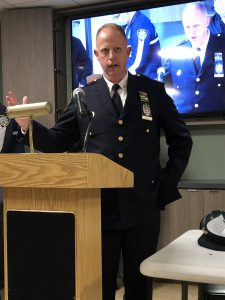
Fresh from a successful two-year stint marked by decreased crime rates at the Times Square Unit, Captain Robert Gault returns to Chelsea—the same place he served as a sergeant a decade ago—to lead the 10th Precinct as their new Commanding Officer. This 22-year veteran of the NYPD sat down with Chelsea Community News (CCN) to talk about his history of service in the city, his past successes and future plan to make the neighborhood safer.
Winnie McCroy, for Chelsea Community News: You did all your schooling in New York: a bachelor’s degree from the State University of New York at Stony Brook, and your Juris Doctor degree from Fordham Law School. You work in Manhattan, and you live in Manhattan: what’s your favorite thing about the city?
Captain Robert Gault, 10th Precinct Commanding Officer: The energy is like no other place, because New York City is really where our country started. You see that in the architecture of Federal Hall, the Stock Market. The historical aspects of this city are tremendous, and I think that’s what attracts people to the city. It really is the center of the universe. That brings with it a lot of energy.
CCN: During your two years as CO [Commanding Officer] of the Times Square Unit, you saw a steady decrease in crime. How did you effect that change?
Captain Gault: Really, a lot of it was done by good deployment, smart policing. We call it “Precision Policing” in the NYPD, in terms of deploying our resources where they’re going to be most effective. Looking at Times Square, a lot of the individuals responsible for those criminal conditions are oftentimes the same people committing the same crimes over and over… That’s when you get the biggest bang for your buck. Knowing who’s there, knowing what the conditions are, and deploying your resources to address those responsible and particularly the criminal conduct that’s occurring.
CCN: Chelsea is currently dealing with serious quality-of-life issues, in places like Eighth Ave. between W. 21st and 22nd Sts., where those issues happen alongside open-air drug dealing and drug use, and residents have reported witnessing organized prostitution on the part of sex shop owners. How is it that these things can go on in the same area, for so long?
Captain Gault: Law enforcement is a complicated business. We’re dealing with not just the enforcement end, but also the follow-up. With Precision Policing we do a lot of analysis and take good care in terms of doing the enforcement. You brought up the question of why we can’t just shut down problematic locations. Well, there are a lot of protections. We don’t just take away people’s right to conduct business until we have conducted a full investigation and there’s due process afforded. What I will say is the NYPD has a very robust legal bureau. For example, you’re talking about shutting down problem “nuisance’ locations.” We have our own Civil Enforcement Unit which is part of the legal bureau and those are the trained attorneys that are involved in taking a civil action. Typically, the public thinks of the police taking criminal action against people; shutting down a location is really a civil action and requires legal process. It’s time-consuming and detail-specific, and you have to dot your i’s and cross all your t’s and afford due process, or it’s going to be all for naught. These are things the police department takes that very seriously. We look at a particular problematic commercial or residential location where there is an issue and ask, “What are all of the available options under the law?” including aspects of civil enforcement, like nuisance abatement.
CCN: Neighbors want to know why the Trespass Affidavit Program was discontinued, which allowed police to arrest “intruders” with a building owners’ prior consent. What should victims, landlords, and supers do to get these petty larceny, grand larceny, and burglary numbers down in Chelsea?
Captain Gault: Keep us aware. When you see criminal activity, report it. A crime in progress, we can be calling the police for. And for the ongoing conditions, we encourage people to go to the Build the Block meetings and talk to the NCO’s [Neighborhood Coordination Officers]. There are three sectors in the 10th Precinct, representing three separate neighborhoods, with three separate cops dedicated to the conditions in those particular areas. They’re the ones most intimate with the issues, and a big part of their job is to gather intelligence, because the function of an NCO is not just community outreach; it’s crime-fighting, doing investigations, and assisting the investigators of our detective squad. Whatever information they [NCOs] bring back from the community is shared, and ultimately can assist us in making summary arrests. If we’re aware of a chronic condition at a location and [steady sectors] have uncommitted time, they can spend their uncommitted time at that location. If they can observe something or establish probable cause, we encourage the communication and I certainly encourage correcting conditions. And a lot of time [that] doesn’t always have to be an arrest, but for criminal matters, an arrest is often very effective.
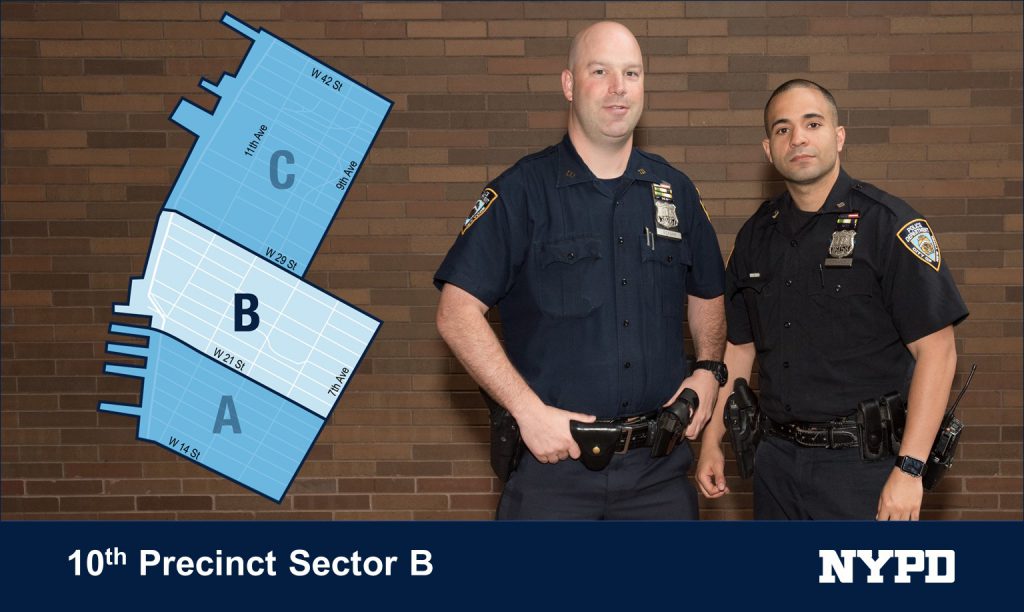
CCN: Would you be in favor of starting community patrol programs again? Recently, the Guardian Angels brought their safety patrols to Chelsea, and we reported that people September’s 10th Precinct Community Council meeting expressed an interest in seeing the Block Watchers program start again. Would any of that be useful to you?
Captain Gault: If something was presented to me, I would certainly be willing to take a look at it. I’d be interested in talking to the organizer and learning what their specific mission would be. Then I would base my evaluation on that. . . I think the police department has shown a willingness to reach out to the public, and that’s a two-way street. If the community shows a willingness to have that conversation, it’s a back and forth, it doesn’t have to be contentious. The community wants to be supported by the police, and the police want to be supported by the community. And policing is one of those things where we get our authority through the community. If the community doesn’t have an appetite for proactive policing, it has a responsibility to communicate that to us, so we can implement strategies that both comport with community expectations and maintain public safety. This is the essence of the social contract between the public and the police.
CCN: You’ve been an NYPD cop for 22 years. What brought you into the service sector, and what are some of the high points of your career?
Captain Gault: Obviously I was influenced by a family of service. I grew up working class, and money and job security was an issue. These are things I thought about. My father’s a retired City worker, so when I got out of college, I wasn’t entirely sure what I wanted to do. I gave some thought to different things, but I was socialized into it. I grew up in Nassau County, in a neighborhood where the cops I knew were role models. We were an Irish-American family, and there’s a long history of Irish-Americans that have raised themselves up in the police department and established themselves in the city. So it’s partly a cultural identity, partly socialization, and then the desire to do something meaningful and significant in my life. And then that combined with the idea of having job security, a pension, the ability to advance—it all just made sense.
CCN: And some of your personal bests?
Captain Gault:: The city was a lot different when I came on the force. I was just catching my stride, and was a young police officer on September 11, 2001, and I remember they had to delay the sergeant test because of the situation after 9/11. But that was a game-changer, too, in terms of not only the way I viewed my role in the police department and the city, but in terms of the heroism I got to see, and the selflessness of people who gave everything in those long hours down there. It wasn’t just the way I looked at things, it was the way everyone viewed the police back then. It was really uplifting, because it was such a horrible situation. I remember on September 12, city buses were designated to bring down all law enforcement to secure the perimeter of Ground Zero, and I remember going down the West Side Highway and people just cheering for us, so that was certainly a very memorable thing, that made me very proud to be part of the police department. And what followed was the outpouring of grief and honoring the fallen, and all the funerals. At that point, just seeing how heroes were laid to rest, seeing bagpipes just became a big thing. I wasn’t a piper at that time, but it was one of the things that inspired me. That became something I wanted to do and learn, and I wound up learning how to play bagpipes and got myself into the Emerald Society Pipe Band, so that’s certainly an accomplishment that goes hand-in-hand with the job. It’s a fraternal music association but it’s part of the NYPD, insomuch as we play at the funerals, the police graduations—it’s a very prideful kind of organization. And the other major turning points were the opportunities I had on this job. I became a sergeant early on, then took the Lieutenants Exam, then I was able to become a captain, then I was like alright, there’s no more tests to take, what do I do next? And [they] gave me the opportunity to take a job down in headquarters, and when I decided I was going to go to law school, I was able to do four years of law school and I became an attorney, which was something I had always wanted to do as well. I can’t say enough great things about the police department. It’s been good to me; it’s been fulfilling and I think I’ve done good work in terms of the places I’ve gone and the relationships I’ve built. That’s one of the things about the police; being a police officer means being a people person, and we have our own subculture. Cops behave in a certain way, but cops really are the salt of the earth. And the people I meet. I wouldn’t have had that opportunity in any other profession.
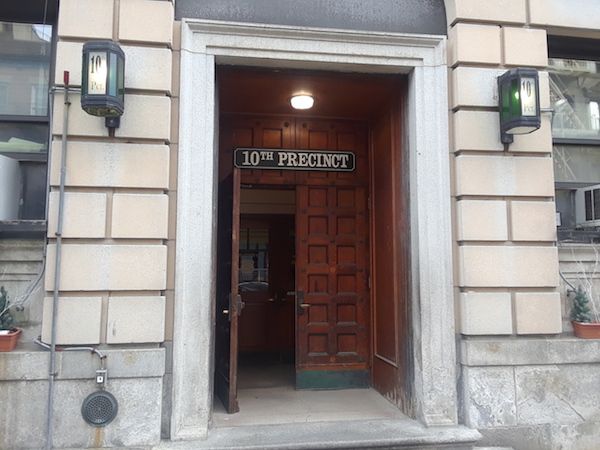
CCN: You served in the 10th Precinct before, back when you were a sergeant. What is it like to return, but this time, as the boss?
Captain Gault: Well I was a sergeant here so it’s not that much of an adjustment, because it wasn’t like I was a police officer here; I was a supervisor here for years. It feels great, because when I worked here for a while as a sergeant under a few different commanders, one of them is now Chief Hughes, the borough commander [Assistant Chief Stephen Hughes, Commanding Officer, NYPD Patrol Borough Manhattan South]. I have such good memories of being a sergeant here, and there’s still plenty of people left from when I was here 10 years ago. To return and come back to those kinds of memories of a really good time of my life, it feels great. The neighborhood just keeps getting better and better in my opinion. It was an interesting place back then but it’s amazing the amount of development and improvements done and it still has that Chelsea feel when you walk around. It’s a very unique neighborhood.
CCN: I recall during a recent Build the Block Meeting [08/20/2020; click here to see CCN’s report], that one of your officers mentioned that the police weren’t feel very loved right now. You’re getting a lot of flak from the community and the mayor. Just last week Chief Fausto Pichardo left because he didn’t like what the mayor was saying, and you mentioned that about 60 offices left the 10th Precinct or took early retirement. How many officers have gone and how has it affected morale for those who remained, to know they’re not getting those officers back?
Captain Gault: I can’t speak to raw numbers because it’s throughout the department that people are leaving; it’s not just Manhattan South. They’re leaving in large numbers and that along, with the fact that they’ve suspended the hiring of new officers of the police academy classes, it creates a situation where we’re stretched very thin. And to be stretched thin at a time in the city and really the country where the climate is hostile to the police, it’s a shame. I don’t really know what this is all about. The police are the protectors, and I think we’re caught in a political thing. The police are in a very tough situation now, and it’s been a very complicated year. The cops are tired, feeling a little beaten down, but cops are resilient people, and this department will get through it, just like we got through 9/11. It’s just a different kind of challenge and I think things are going to get better. I’ll tell you straight up and I think a lot of people would agree with me: The current situation right now is not sustainable. Things have to turn around and people have to start respecting the police. You don’t have to be friends with the police, you don’t have to rally for them, but in a civilized society there has to be the understanding that somebody has to be charged with maintaining law and order; and in our society, it is the police.
CCN: Neighbors are asking to do outreach to residential business owners to help them review building entrance security, and report intruders without fear of repercussions from criminals arrested then released a few hours later?
Captain Gault: I haven’t made a lot of changes since I’ve been here, but I have identified somebody who I’d like to be my new Crime Prevention Officer, and that’s an area I’m going to have an expectation he’ll engage with the community and he’s going to educate them. We’re sending him for training in the Crime Prevention section under the Community Affairs Bureau. A lot of it is common sense, but sometimes common sense is not all that common, and sometimes if somebody is trained, they can look into a couple of simple little fixes. I think it serves two purposes: The community gets to meet a specialized police officer that can show them some of the services we offer and resources we have, and then sometimes if you make a couple simple switches it can improve your overall security.
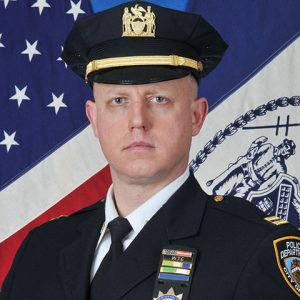
CCN: Your time in the 42nd Precinct in the Bronx saw you delve into Precision Policing to deal with “violent youth crews engaged in a criminal enterprise.” Are teenage gang members a particularly big problem in NYC? What are they doing/examples? How are they being targeted toward better public safety?
Captain Gault: I don’t think Chelsea has a large gang problem, but I’m certainly going to be analyzing and digging deeper into what some of the underlying crimes are. I don’t think there’s a huge youth crime center here, but I know that there are youth in need of services in the community here. There’s the Covenant House, and some complicated issues up there, and I kind of want to get an education on how I can add value to helping out. Under the auspices of the neighborhood policing philosophy, we now have something called YCOs, Youth Coordination Officers, who work under the NCO sergeants. The model of the YCO program is a little different, too, because the issues are not just during school hours. Kids hang after school, too. Traditionally, the youth officer would work school hours Monday to Friday, but these are not necessarily school issues, they’re youth issues. So now youth officers start their tour a little later so they’re still there after school. So if these kids are cutting school or getting into trouble, it’s bigger than just truant officers, it’s a more robust program and they’re getting a lot more training. They’re expected to work not just Monday to Friday, but a piece of the weekend as well. If the youth has weekends off, they’ll be doing stuff during the weekends and they’ll need guidance and services, and that’s what we’re looking to work on.
CCN: Your work as Deputy Commissioner of the Office of Strategic Communications saw you overseeing many communications and messaging initiatives. If you could communicate a message of hope to your area, what would that look like?
Captain Gault:The best is yet to come! We’re going to get through this rough year. A lot of people are suffering, a lot of people have anxiety, there’s a lot of politics going on now, but this too shall pass. The police are always going to be here, we’re always looking to get better, but Chelsea’s still a great neighborhood. I’d been out of here a while but when I walk around, it’s a great place and it’s got great people.
The 10th Precinct is located at 230 W. 20th St. (btw. Seventh & Eighth Aves.). Community Council meetings take place on the last Wednesday the month at 7pm an the precinct or locations in the community. For more information, click here. The Oct. 28 Community Council meeting will be its first-ever, via Zoom. To sign up and get info, click here to leave a message on the 10th Precinct Community Council’s Facebook page.
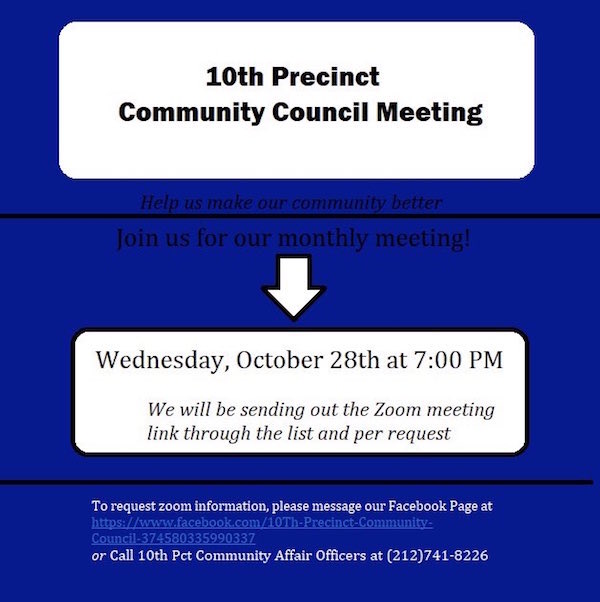
Chelsea Community News is made possible with the help of our awesome advertisers, and the support of our readers. If you like what you see, please consider taking part in our GoFundMe campaign (click here). To make a direct donation, give feedback, or send a Letter to the Editor, email scott@chelseacommunitynews.com.

Pingback: MCB4 Sees Midtown North CO Address Enforcement, Past and Pending - Chelsea Community News
Pingback: ปั้มฟอล
Pingback: Las Vegas SEO Co
Pingback: barber Melbourne
Pingback: you could look here
Pingback: bonanza178 slot
Pingback: รับทำวิจัย
Pingback: naakte borsten
Pingback: Jan. 31 Community Counil Meeting is First to Follow Dec. Do/Don’t & Will/Won’t Declarations - Chelsea Community News
Pingback: สล็อตสายบุญ มีข้อดี อย่างไร ?
Pingback: top article
Pingback: interieur ontwerp Aalten
Pingback: 늑대닷컴
Pingback: 영화 사이트
Pingback: maryland cornhole
Pingback: Side hustle
Pingback: passive income ideas
Pingback: anti screenshot
Pingback: บาคาร่า
Pingback: Text inmate
Pingback: bergara b14 wilderness
Pingback: maxbet
Pingback: สล็อตวอเลท ไม่มีขั้นต่ำ
Pingback: nova88
Pingback: Vanessa Getty wiki
Pingback: wow slot
Pingback: valid dumps pin shop
Pingback: cvv and dumps
Pingback: mushroom growing kit
Pingback: Recidivist Chelsea Burglar, ID’d as April Stabbing Assailant, Behind Bars as Mental Health Questions Linger – Chelsea Community News
Pingback: cartier replica engagement rings south africa